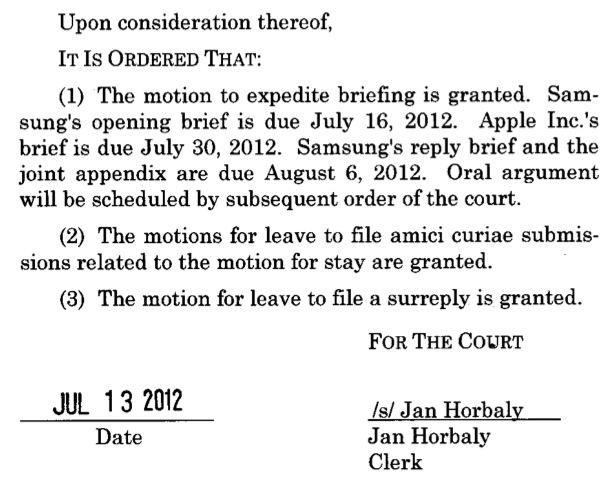The decision to push-up the appeal bodes well for the South Korean company, reports FOSS Patent's Florian Mueller, as the related Apple v. Samsung federal lawsuit is scheduled to start some two years from now, meaning an unresolved injunction appeal could keep Nexus units off shelves for the duration.
Samsung now has until July 16 to file its court brief which will be followed by an Apple response by July 30 and subsequent reply from the Galaxy maker before August 6.
Apple first won the preliminary injunction in late June after it successfully leveraged a unified search patent but Samsung filed for a stay of the sales ban with both the California District Court and the CAFC. District Judge Lucy Koh, who handed down the injunction ruling, denied the motion to stay on July 3, but the CAFC granted an identical motion less than a week later.
The brief two-page order does not state how long Samsung's stay will last ahead of the official appeal hearings but Mueller believes a decision regarding the matter will be handed down late Friday or early next week.
Also accepted by the CAFC was Sprint and Google's amici curiae briefs against Apple's sales ban. Apple pointed out that Google should not be considered an amicus curiae, or friend of the court, as the internet search giant is both the developer of Android and worked extensively with Samsung on development of the Galaxy Nexus. The iPhone maker went on to point out that Google is represented in district court by the same law firm as Samsung and claimed the Mountain View, Calif., company retained the services of a different firm for the federal suit in an attempt to conceal this fact.
The day was not completely Samsung's favor, however, as it was ordered Apple's sur-reply to the motion to stay will be considered.
From the sur-reply:
"Samsung, in its reply brief, has not disputed that immediate enforcement of the injunction would result in no irreparable harm to Samsung. In the absence of such harm to the moving party, there is no conceivable basis for issuing a stay of the injunction. Without addressing that fundamental point, Samsung’s reply focuses solely on supposed harms to third parties, which do not and cannot warrant a stay pending appeal. See, e.g., Apple's Response to Sprint's Motion for Leave to Participate as Amicus Curiae.To support its new theory, Samsung seizes upon a letter that Apple sent to various carriers and retailers, informing them of the injunction and asking them to discontinue the sale of infringing Galaxy Nexus devices. That Apple would inform others of the entry of the injunction could not have come as any surprise to Samsung given Apple’s continued efforts to enforce its intellectual property rights. Moreover, Apple’s letter shows nothing beyond the entirely predictable consequence of Samsung's infringement— i.e., the infringing products must be taken off of the market. It is not a legally cognizable harm to halt downstream sales of stolen, pirated, counterfeit, or infringing products.
In any event, as the court below and this Court have repeatedly found, the mere fact that third parties might face a disruption in their efforts to distribute infringing products is absolutely irrelevant at the stay stage. Because Samsung is the moving party seeking a stay, Samsung has the burden of proving that it would be irreparably harmed in the absence of an injunction. Although harms to third parties (and the public at large) might be considered when addressing the 'public interest' factor, a belated submission on that single factor does not satisfy Samsung's heavy burden of showing that a stay is necessary to protect its own interests. Indeed, in the absence of irreparable harm to Samsung—which Samsung now concedes— no stay may issue regardless of all the other factors.
Samsung's motion to stay the preliminary injunction should be denied."
While the motions and replies have been accepted, the court must now decide on whether to agree to any or all terms set forth by parties.
 Mikey Campbell
Mikey Campbell







-m.jpg)






 Marko Zivkovic
Marko Zivkovic
 Christine McKee
Christine McKee
 Andrew Orr
Andrew Orr
 Andrew O'Hara
Andrew O'Hara
 William Gallagher
William Gallagher

 Mike Wuerthele
Mike Wuerthele
 Bon Adamson
Bon Adamson




-m.jpg)



119 Comments
This for the guys responsible for a 700 point questionnaire.
Thanks for giving the Galaxy Nexus even more publicity Apple.
Now that you're trying to ban it, people want it even more.
Thanks for giving the Galaxy Nexus even more publicity Apple.
Now that you're trying to ban it, people want it even more.
I just placed my order for one. :D
Thanks Apple. :D
I just placed my order for one. :D
Thanks Apple. :D
Isnt the SG3 better or does JB make that much of a difference?
Isnt the SG3 better or does JB make that much of a difference?
The SG3 has better hardware. That's the phone I would recommend to anyone who wants to renew their contract.
But if you're already on one, $349 still gets you excellent hardware with the latest AOSP release of Jelly Bean 4.1.1. And the best dev community out of all phones. I was able to get my Galaxy Nexus to run Ubuntu with a bluetooth keyboard and mouse